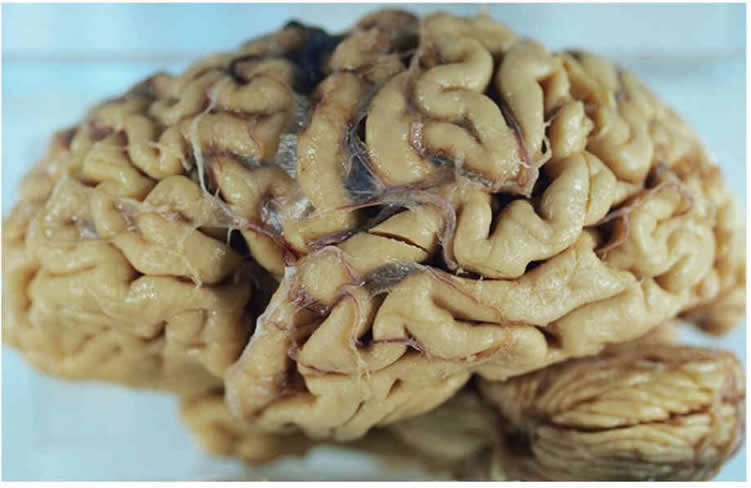Summary: Researchers report the brains of people with Alzheimer’s disease contain less of the exercise related hormone called irisin. Boosting levels of irisin in the brain could slow the progression of the neurodegenerative disease.
Source: Queen’s University.
Queen’s University researcher Fernanda De Felice (Psychiatry), along with co-authors from the Federal University of Rio de Janeiro, have identified an exercise-linked hormone that could slow the progression of Alzheimer’s disease. This research was recently published in the high-profile publication, Nature Medicine.
The findings show that irisin, a hormone that is boosted by exercise, plays an important role in the brain and that Alzheimer patients carry less of the hormone. This discovery moves scientists one step closer to developing a medication that reproduces the effects of exercise-induced irisin production in the brain.
“In the past few years, researchers from many places around the world have shown that exercise is an effective tool to prevent different forms of dementia such as Alzheimer’s” says Dr. De Felice, a researcher in the Centre for Neuroscience Studies at Queen’s. “This has led to an intense search for specific molecules that are responsible for the protective actions of exercise in the brain. Because irisin seems to be powerful in rescuing disrupted synapses that allow communication between brain cells and memory formation, it may become a medication to fight memory loss in Alzheimer’s disease.”
The new research is important, explains Dr. De Felice, because curing dementia is one of the greatest current and future health care challenges. Unfortunately, despite 30 years searching for treatment drugs, there is no effective medication for Alzheimer’s disease. She adds it is also important to remember that the vast majority of patients with dementia can be disabled due to other age-related illness (e.g. arthritis, heart disease, obesity, visual problems, and depression). Furthermore, it can be challenging to engage a patient in regular physical activity.

A drug that increases irisin in the brain could be the key.
“It is important to keep in mind that Alzheimer’s is a very complex disease and it is truly hard to treat Alzheimer’s patients before irreversible damage occurs in their brains. This is because when a patient is diagnosed with Alzheimer’s disease, their brain has already been damaged,” Dr De Felice says. “Finding new protective routes, such as the identification of an exercise-linked component, may be an optimal strategy to heal the brain before brain cells die and dementia becomes irreversible.”
The next step in Dr. De Felice’s research is investigating the most effective way of delivering irisin to the brain.
Source: Anne Craig – Queen’s University
Publisher: Organized by NeuroscienceNews.com.
Image Source: NeuroscienceNews.com image is in the public domain.
Original Research: Abstract for “Exercise-linked FNDC5/irisin rescues synaptic plasticity and memory defects in Alzheimer’s models” by Mychael V. Lourenco, Rudimar L. Frozza, Guilherme B. de Freitas, Hong Zhang, Grasielle C. Kincheski, Felipe C. Ribeiro, Rafaella A. Gonçalves, Julia R. Clarke, Danielle Beckman, Agnieszka Staniszewski, Hanna Berman, Lorena A. Guerra, Letícia Forny-Germano, Shelby Meier, Donna M. Wilcock, Jorge M. de Souza, Soniza Alves-Leon, Vania F. Prado, Marco A. M. Prado, Jose F. Abisambra, Fernanda Tovar-Moll, Paulo Mattos, Ottavio Arancio, Sergio T. Ferreira & Fernanda G. De Felice in Nature Medicine. Published December 27 2018.
doi:10.1038/s41591-018-0275-4
[cbtabs][cbtab title=”MLA”]Queen’s University”Exercise Hormone May Slow Alzheimer’s Progression” NeuroscienceNews. NeuroscienceNews, 7 January 2019.
<https://neurosciencenews.com/hormone-alzheimers-progression-10468/>.[/cbtab][cbtab title=”APA”]Queen’s University(2019, January 7). Exercise Hormone May Slow Alzheimer’s Progression. NeuroscienceNews. Retrieved January 7, 2019 from https://neurosciencenews.com/hormone-alzheimers-progression-10468/[/cbtab][cbtab title=”Chicago”]Queen’s University”Exercise Hormone May Slow Alzheimer’s Progression.” https://neurosciencenews.com/hormone-alzheimers-progression-10468/ (accessed January 7, 2019).[/cbtab][/cbtabs]
Abstract
Exercise-linked FNDC5/irisin rescues synaptic plasticity and memory defects in Alzheimer’s models
Defective brain hormonal signaling has been associated with Alzheimer’s disease (AD), a disorder characterized by synapse and memory failure. Irisin is an exercise-induced myokine released on cleavage of the membrane-bound precursor protein fibronectin type III domain-containing protein 5 (FNDC5), also expressed in the hippocampus. Here we show that FNDC5/irisin levels are reduced in AD hippocampi and cerebrospinal fluid, and in experimental AD models. Knockdown of brain FNDC5/irisin impairs long-term potentiation and novel object recognition memory in mice. Conversely, boosting brain levels of FNDC5/irisin rescues synaptic plasticity and memory in AD mouse models. Peripheral overexpression of FNDC5/irisin rescues memory impairment, whereas blockade of either peripheral or brain FNDC5/irisin attenuates the neuroprotective actions of physical exercise on synaptic plasticity and memory in AD mice. By showing that FNDC5/irisin is an important mediator of the beneficial effects of exercise in AD models, our findings place FNDC5/irisin as a novel agent capable of opposing synapse failure and memory impairment in AD.






